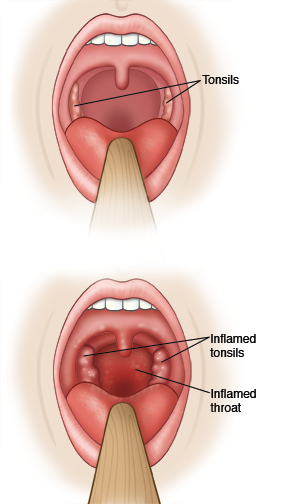You or your child has a sore throat (pharyngitis). This infection is caused by a virus. It can cause throat pain that is worse when swallowing, aching all over, headache, and fever. The infection may be spread by coughing, kissing, or touching others after touching your mouth or nose. Antibiotic medicines don't work against viruses. They are not used for treating this illness.
Home care
-
If symptoms are severe, you or your child should rest at home. Return to work or school when you or your child feels well enough.
-
You or your child should drink plenty of fluids to prevent dehydration.
-
Adults and children 5 years and older can use throat lozenges or numbing throat sprays to help reduce pain. Gargling with warm saltwater will also help reduce throat pain. Dissolve 1/2 teaspoon of salt in 1 glass of warm water. Children can sip on juice or an ice pop. Children 5 years and older can also suck on a lollipop or hard candy. (Hard candy and lozenges can be a choking hazard in children younger than 5 years.)
-
Don’t eat salty or spicy foods or give them to your child. These can irritate the throat.
Medicines for a child: You can give your child acetaminophen for fever, fussiness, or discomfort. In babies over 6 months of age, you may use ibuprofen or acetaminophen. If your child has chronic liver or kidney disease or ever had a stomach ulcer or gastrointestinal bleeding, talk with your child’s health care provider before giving these medicines. Aspirin should never be used by any child under 18 years of age who has a fever. It may cause severe liver damage and death. Don't give your child any other medicine without first asking your child's provider.
Medicines for an adult: You may use acetaminophen, naproxen, or ibuprofen to control pain or fever, unless another medicine was prescribed for this. If you have chronic liver or kidney disease or ever had a stomach ulcer or gastrointestinal bleeding, talk with your provider before using these medicines.
Follow-up care
Follow up with a health care provider, or as advised, if you or your child aren't getting better over the next week.
When to get medical advice
Contact your health care provider right away if you or your child has:
-
A fever of 100.4°F (38°C) or higher, or as advised by the provider (see "Fever and children" below).
-
New or worse ear pain, sinus pain, or headache.
-
Painful lumps in the back of neck.
-
A stiff neck.
-
Lymph nodes are getting larger.
-
Problems opening the mouth wide due to throat pain.
-
A new rash.
-
Other symptoms that get worse.
Call 911
Call
-
Trouble breathing or noisy breathing.
-
A muffled voice.
-
Difficulty swallowing liquids, a lot of drooling, or any other symptoms that may mean worse swelling in the throat.
-
Signs of dehydration, such as very dark urine or no urine, sunken eyes, or dizziness.
Fever and children
Use a digital thermometer to check your child’s temperature. Don’t use a mercury thermometer. There are different kinds and uses of digital thermometers. They include:
-
Rectal. For children younger than 3 years, a rectal temperature is the most accurate.
-
Forehead (temporal). This works for children age 3 months and older. If a child under 3 months old has signs of illness, this can be used for a first pass. The health care provider may want to confirm with a rectal temperature.
-
Ear (tympanic). Ear temperatures are accurate after 6 months of age, but not before.
-
Armpit (axillary). This is the least reliable but may be used for a first pass to check a child of any age with signs of illness. The provider may want to confirm with a rectal temperature.
-
Mouth (oral). Don’t use a thermometer in your child’s mouth until they are at least 4 years old.
Use the rectal thermometer with care. Follow the product maker’s directions for correct use. Insert it gently. Label it and make sure it’s not used in the mouth. It may pass on germs from the stool. If you don’t feel okay using a rectal thermometer, ask the provider what type to use instead. When you talk with any provider about your child’s fever, tell them which type you used.


